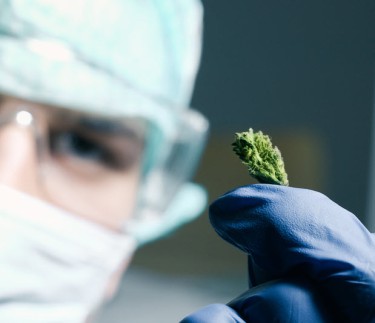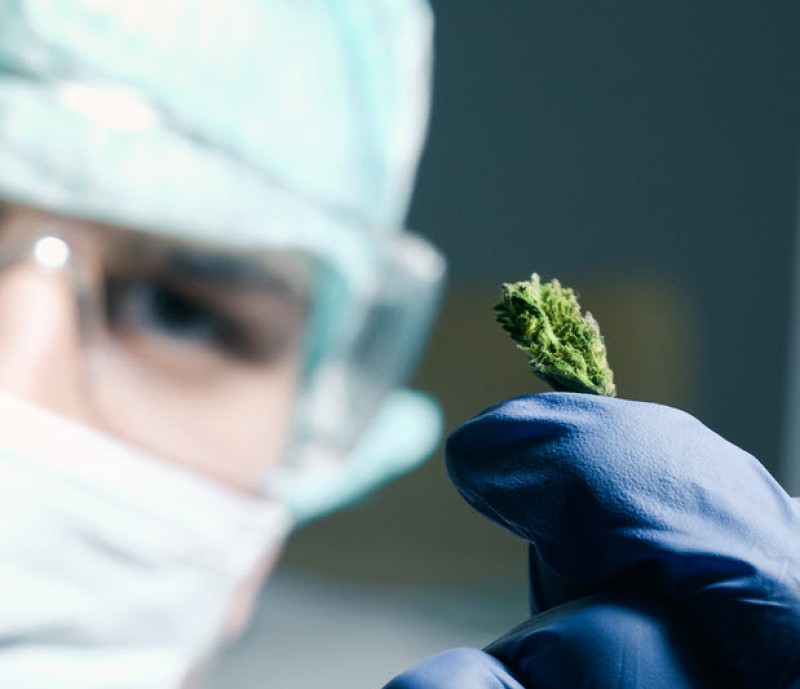
The Feds To Fund Studies On Cannabis and Cancer
The Question Is: Are The Studies Going To Be Biased Against Cannabis?
There’s easily a few dozen studies out there detailing how the various compounds in cannabis can help fight cancer in many different ways.
But for the National Institutes of Health (NIH), a federal agency, there simply isn’t enough. They will soon be subsidizing studies so that researchers can analyze the pros and cons of using cannabis for cancer.
They recently released an notice stating that 1 in 4 cancer patients admitted to using marijuana for managing cancer symptoms such as pain, nausea, and anorexia; however, “research about their health effects, including potential harms and benefits, remain limited.” According to them, the main reason behind the call for more studies is to “promote research in understanding the mechanisms by which cannabis and cannabinoids affect cancer biology, cancer interception, cancer treatment and resistance, management of cancer symptoms,” reports MarijuanaMoment.
Additionally, they include a summary of the current research available plus 8 areas of interest that they want further investigated. According to the NIH, “studies of other cancer types have shown no or inconsistent association with cannabis use, but these data are limited.”
“Cancer cell line experiments show that THC and CBD can mediate many anti-tumor effects, including inducing apoptosis and inhibiting cell proliferation, invasion, and angiogenesis,” they add. “These anti-tumor activities have led to early clinical testing of THC and CBD for glioblastoma and prostate cancers.”
The areas of focus they want insight into include the impact of exogenous cannabinoids on cancer development, learning more about the endogenous cannabinoid pathways and its impact on the development of cancer, the impact of cannabinoids on cancer treatment, how cannabinoids work with cancer interception, how cannabinoids alleviate the symptoms of cancer, how cannabis works with other factors including microbiome, diet, alcohol, and tobacco on cancer.
Federally Sanctioned Studies Would Be Taken More Seriously
Even though there’s a large and growing body of research into cannabis for cancer, very little of it has been sanctioned by the feds and in the eyes of the federal government, other studies should be taken with a grain of salt.
The situation of scientific research into cannabis is by no means simple. Researchers have numerous hurdles to overcome. Which is why, if we want to better understand the mechanisms behind how cannabis does benefit cancer patients, there are many other questions to ask. Much of the research currently focuses on apoptosis, or cell death, since cannabinoids have been shown to cause cancer cells to kill themselves. Other studies show that they are beneficial in blocking the growth of cancer cells through inhibitors, half inflammation in its tracks, inhibit blood vessel development which tumors rely on to grow and spread, stop cytokine production, and eliminate the ability of cancer cells to spread.
Now, since cannabis has more than 100 cannabinoid within the plant, doctors can’t rely on a one-size-fits-all solution for cancer patients. There is still so much we need to know about the phenotypes and genetics of the cannabis plant so that we can come up with an effective and safe dosage of cannabinoids as well as their beneficial flavonoids and terpenes to target specific cancers.
Decades of prohibition have made it challenging for oncologists to gain scientific evidence from clinical trials – much more of which are needed as well.
For these reasons and more, it’s good news that the NIH is funding more studies. “Studies that integrate expertise from multiple disciplines, incorporate state-of-the-art, human-relevant models (e.g. organoid or patient-derived xenograft models) and utilize advanced technologies and methods are strongly encouraged,” said the NIH. They also recognized the hurdles that researchers have to jump through; last year, they posited in an article that administrative burdens are nothing but an obstacle for scientific investigation for successful studies into the health benefits of cannabis.
“Conflicting federal and state cannabis regulations hinder research in several ways, including the inability of researchers to access products that are legal in their state, a lack of standardization and quality control of cannabis and cannabis-derived products within and across states, and no national oversight of this standardization and quality control or the industry,” they wrote.
NIDA Also Pushes for Research on Cannabis
Meanwhile, the National Institutes on Drug Abuse (NIDA), the main federal drug agency, has earlier this year reinstated their push into more federally funded studies on marijuana since more states are adopting cannabis policies. However, they are more interested on studies examining how the various state policies across the country impact public health.
In February of this year, they released a notice calling to “encourage grant applications on the effects of changing cannabis laws and policies in the US and globally on public health,” they wrote.
“Policies around of cannabis products (including whole plant cannabis and cannabis constituent compounds) in the United States (and globally) continue to evolve, and far outpace the knowledge needed to determine the public health impacts of these changes,” reads the notice. “Growing numbers of states have loosened restrictions on cannabis, including those on sales and use, by passing medical marijuana laws or by making cannabis legal for adult recreational use, and in increasing numbers, states have done both.”
The way we see it, cannabis laws and studies simply aren’t keeping up with the times. Even if the federal government thinks that there is a dearth of studies or that cannabis may have side effects that we need to know more about, it’s not going to stop states from legalizing cannabis as needed nor will it stop people from using it because it’s legal in their state.
It’s all up to the federal government to catch up with the times, and finally reschedule cannabis – which should have been done yesterday.
CANCER RESEARCH WITH CANNABIS, READ MORE...
TRIPLE NEGATIVE BREAST CANCER AND CANNABIS STUDY RELEASED!







